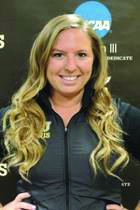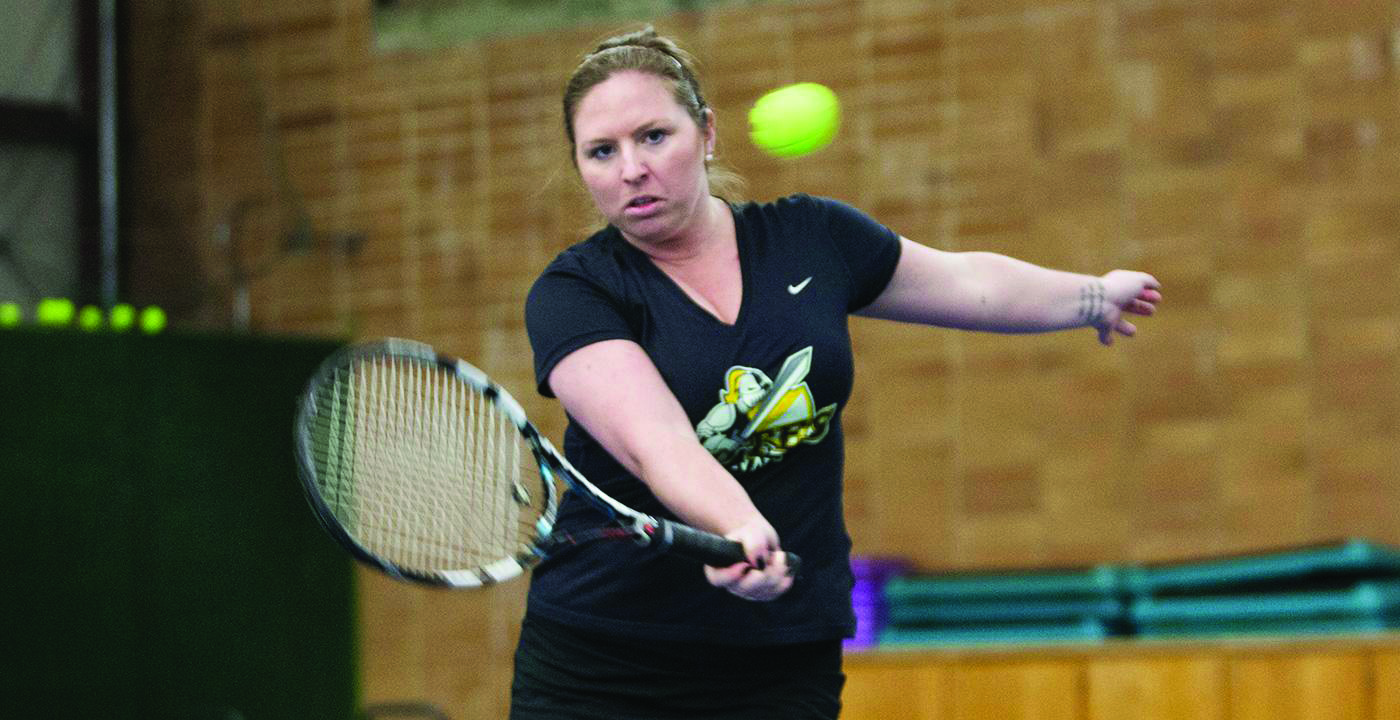MCKENNA MORIN; Photo Editor: morinmn@plu.edu
After tearing her anterior cruciate ligament (ACL) back in March, captain of the Pacific Lutheran University Women’s Tennis team is on her way to recovery, but is out for her final season. The PLU senior who has played tennis all four years, is now putting down the racquet on her road to recovery.
During a third set tie breaker Samantha Lund tore her ACL. Lund was playing for personal points when she went for a “crazy angle ball” served to her by her opponent. Lund had to make the decision to either go for it or risk losing the points and possibly the match.
“It’s my senior year; I’m going to regret not going for every ball,” Lund said.
Making the quick choice of going after it, Lund sprinted to the other side of the court. After touching the ball with her racket, Lund’s knee locked and hyper-extended back, sending her falling forward. But the worst was still to come.
 “On my way down I just felt like a pop, and that’s the scariest thing, when you feel a pop you know something’s wrong. That’s the scariest thing any athlete has ever experienced,” Lund said.
“On my way down I just felt like a pop, and that’s the scariest thing, when you feel a pop you know something’s wrong. That’s the scariest thing any athlete has ever experienced,” Lund said.
Lying on her back in the middle of the court, Lund said she felt no pain but was worried about the pops. The trainer came over and Lund explained what happened as she got back up. Even though she was in no pain, the trainer told her to stop the match in fear of the worst.
After a few days of feeling fine with little pain, no swelling or bruising and keeping up on her regular activities, Lund went in for a precautionary X-Ray and MRI. When she got the results back, her fear had come true. It was a torn ACL. This would mean surgery, recovery, physical therapy, and most importantly, no tennis for the rest of her senior year.
For any athlete, being taken out of their sport, especially in an important season like senior year, can be devastating. Even though Lund said it can be sad and depressing, she knows she has to push through because at some point she may want to play again.
“Somewhere in the next 50-60 years of my life I’m going to want to play” Lund said.
The hard part is being a senior and not having time to get better to play again. But Lund knows it could have been worse. After making the documentary “INjured and OUT” last year, on athletes who became injured and can no longer play their sport for the rest of their life, Lund said she feels lucky to know that this injury is temporary. Hearing it and experiencing it are two very different things. Lund said while making the documentary, people would tell her about being depressed and sad but she could only sympathize. Now Lund is experiencing the same struggles and can empathize with the athletes she worked with.
“It was really hard for me at night. You’re lying there and it just feels very different to not feel like yourself,” Lund said.
Being an athlete for most of her life, losing tennis was like losing part of herself. Lund was still able to attend practice but couldn’t participate. As captain, Lund had to motivate her teammates to continue on and do their best, while she did her best to deal with the mix of emotions she was feeling from not playing.
“It’s weird to go day by day trying to figure out who you are because you’re not an athlete anymore.” Lund said, “You’re something different. It’s difficult because you get into your own brain about it”.
Lund found it easier to stay positive when she was put in front of people, her team, her friends, her coaches. Staying positive was a lot easier for Lund when people were looking at her.
Lund isn’t the only athlete who has been injured playing her sport. According to the “Morbidity and Mortality Weekly Report” from the US Department of Health and Human Services/Centers for Disease Control and Prevention, the average annual national estimate of the number of athlete-exposures and injuries is 35,333,250 athletes. Women’s tennis averages 663,630 injured athletes per year.
PLU athletes are contributors to this large number. Senior Kellen Westering is a PLU football player who was recently injured and has been injured many times before. Westering has had the same struggles as Lund. He has been taken out of games and practice due to injury and has dealt with the emotional roller-coaster that comes with being out. Westering took solace in being the team cheerleader when he couldn’t play.
“It makes me appreciate just being able to practice. It teaches you not to take anything for granted,” Westering said .
Lund had to learn how to be the best cheerleader for her team, just like Westering. As captain and the only senior, Lund had to put on a smile and make sure her team got to their full potential, even without her. Lund had fully embraced the saying “fake it till you make it” to help her accomplish this.
“It’s one of the easiest things to stay strong for other people than it is to stay strong for yourself,” Lund said.
Lund pushed through the sadness by staying motivated for her future in tennis and for those around her. Even though Lund said it’s hard to ask for help and rely on others, she is slowly rebuilding her strength. She is finding new ways to stay positive for her team and herself. Lund is getting stronger emotionally, mentally and physically with hopes to return to tennis in the future.



















